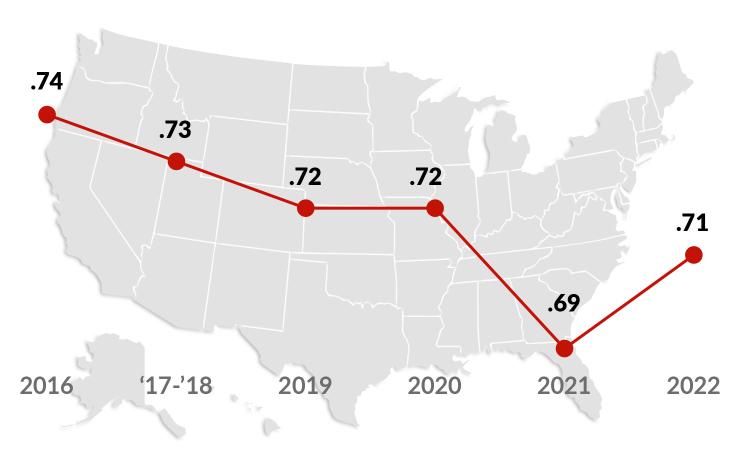


WASHINGTON (Oct. 26, 2022) – For the fifth year in a row, the rule of law has declined globally, according to the 2022 World Justice Project (WJP) Rule of Law Index®.
The World Justice Project’s analysis of in-depth survey data in 140 countries and jurisdictions shows that adherence to the rule of law fell in 61% of countries this year.
“Authoritarian trends that predate the pandemic continue to erode the rule of law,” said Elizabeth Andersen, executive director of the World Justice Project (WJP). “Checks on executive power are weakening and respect for human rights is falling.”
As the world emerges from the pandemic, the Index finds that rule of law declines are less widespread and extreme than last year, when Covid shutdowns dramatically disrupted justice systems and governments exercised emergency powers that curtailed civic freedoms and bypassed accountability mechanisms.
Still, two-thirds of countries whose scores declined in 2021 declined again in 2022, and scores for seven of the eight factors that the Rule of Law Index measures fell in the majority of countries for the second year in a row. Only the Index measure for “Order and Security” improved in a slight majority of countries, and only marginally.
Most notably, the Index measure of “Fundamental Rights” declined in two-thirds of countries this year. “Civil Justice” fell in 61% of countries, largely due to continued delays, weak enforcement, and discrimination in the justice system.
The factor that measures the key checks and balances that counter authoritarianism, “Constraints on Government Powers,” fell in 58% of countries this year.
“We are emerging from the health crisis, but not the governance crisis,” Andersen said.
“Today, 4.4 billion people live in countries where the rule of law is weaker than it was last year.”
Over the longer term, the most dramatic rule of law declines have been in Index factors associated with rising authoritarianism.
Respect for fundamental human rights and freedoms is down in three-quarters of countries since 2015, and “Constraints on Government Powers”–including oversight by the judiciary, legislature, and media–has fallen in two-thirds of countries studied.
“At its heart, rule of law is about fairness–that is, accountability, equal rights, and justice for all—and a less fair world is bound to be a more volatile one,” Andersen said.
“Rule of law is also a key underpinning of democracy, which is faltering in many countries around the world.”
Since 2015, the Index subfactors that have declined the most widely are freedom of opinion and expression(down in 81% of countries) and freedom of assembly and association (down in 85%). The Index subfactor measuring whether transition of power is subject to the law has declined in two-thirds of countries.
All these subfactors continued to decline this year, making it more challenging for citizens to slow or reverse the trend of rising authoritarianism.
The WJP Rule of Law Index is the world’s leading source of original, independent rule of law data. Now covering 140 countries, this year’s Index relies on surveys of more than 150,000 households and 3,600 legal practitioners and experts to determine how the rule of law is experienced and perceived around the world.
Published annually since 2009 and subject to a rigorous methodology, the Index is used by governments, multilateral organizations, donors, the private sector, and civil society organizations around the world to assess and address gaps in the rule of law.
It measures 44 rule of law indicators, or subfactors, which feed into scores for eight factors: Constraints on Government Powers, Absence of Corruption, Open Government, Fundamental Rights, Order and Security, Regulatory Enforcement, Civil Justice, and Criminal Justice. These scores are then averaged to assign an overall rule of law score to each country.
The top-ranked country in the WJP Rule of Law Index 2022 is Denmark, followed by Norway (2), Finland (3), Sweden (4), and the Netherlands (5). The bottom ranked countries are Venezuela (140), Cambodia (139), Afghanistan (138), the Democratic Republic of Congo (137), and Haiti (136).
The countries with the biggest decline in rule of law this year are Sudan, Myanmar, Haiti, Afghanistan, and Nicaragua. The countries that improved their rule of law score the most this year are Honduras, Kosovo, Belize, Moldova, and the United States.
Honduras, Belize, and the United States all regained lost ground after recent elections and changes in administration. However, the United States’ score remains below 2020 levels. The other two top improvers this year, Kosovo and Moldova, are actively seeking membership in the European Union.
PRESS RESOURCES:
ABOUT THE WJP RULE OF LAW INDEX:
The World Justice Project (WJP) Rule of Law Index® is the world’s leading source for original, independent data on the rule of law. Now covering 140 countries and jurisdictions, the Index relies on more than 150,000 household surveys and 3,600 legal practitioner and expert surveys to measure how the rule of law is experienced and perceived worldwide. The Index provides current and reliable information to policy makers, civil society organizations, academics, citizens, and legal professionals, among others, and is intended to encourage policy reforms, guide program development, and inform research to strengthen the rule of law.
ABOUT THE WORLD JUSTICE PROJECT:
The World Justice Project (WJP) is an independent, multidisciplinary organization working to create knowledge, build awareness, and stimulate action to advance the rule of law worldwide. Effective rule of law reduces corruption, combats poverty and disease, and protects people from injustices large and small. It underpins development, accountable government, and respect for fundamental rights, and it is the foundation for communities of justice, opportunity, and peace.
The World Justice Project defines the rule of law as a durable system of laws, institutions, norms, and community commitment that delivers: accountability, just laws, open government, and accessible justice. Learn more about these four universal principles and our work at: www.worldjusticeproject.org.